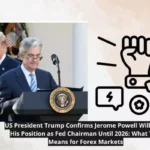In a surprising announcement on Sunday evening, US President Donald Trump revealed plans to impose a 100% tariff on all foreign-produced movies entering the United States. This decision marks a significant shift in the US trade strategy, aimed at supporting local filmmakers and reshaping the global entertainment landscape.
The Announcement
President Trump stated that the US Trade Representative and the Commerce Department would immediately begin the regulatory process for implementing the tariffs. “This is about prioritizing American creativity and ensuring our film industry thrives without unfair competition,” Trump declared during a press briefing.
Market Impact
Following the announcement, the US Dollar Index (DXY) showed a slight decline, down 0.03% at 99.95 as of press time. Market analysts are closely monitoring the potential ripple effects across the global film industry and the US economy.
Why Tariffs on Foreign Films?
The administration argues that foreign films often dominate US theaters, creating challenges for domestic filmmakers to compete. By imposing tariffs, the government aims to level the playing field, incentivize local production, and retain revenue within the country.
Potential Effects on the Entertainment Industry
The proposed tariff has sparked debate among industry professionals. While some view it as a lifeline for the struggling US film sector, others fear it could backfire by limiting diversity and reducing options for American audiences. Additionally, there are concerns about retaliation from international partners.
Understanding Tariffs
What are tariffs? Tariffs are taxes levied on imported goods, designed to protect domestic industries by increasing the cost of foreign products.
How do tariffs differ from taxes? Unlike taxes, which are paid by consumers or businesses, tariffs are borne by importers at the point of entry.
Are tariffs beneficial? Economists remain divided. While tariffs can protect local industries, they may also lead to higher prices and trade disputes.
Trump’s Trade Vision
This move aligns with Trump’s broader tariff policy aimed at reducing dependence on imports, boosting local industries, and addressing trade imbalances. During his 2024 campaign, Trump emphasized tariffs as a key strategy to “bring back American greatness.”
What’s Next?
The entertainment industry and trade experts are bracing for potential countermeasures from major movie-exporting nations like Canada, India, and the European Union. As discussions unfold, all eyes will be on the White House and its next steps in reshaping US trade and economic policy.
Impact on Forex Markets
While the policy primarily targets the entertainment industry, it could indirectly influence Forex markets. The slight dip in the US Dollar Index (DXY) after the announcement suggests cautious market sentiment. Broader trade tensions could escalate if major exporting nations retaliate, potentially impacting trade-sensitive currencies such as the Canadian Dollar (CAD), Euro (EUR), and Indian Rupee (INR).
Moreover, heightened economic uncertainty may drive investors toward safe-haven currencies like the Japanese Yen (JPY) and Swiss Franc (CHF). Protectionist policies could also introduce inflationary pressures, influencing Federal Reserve monetary policy decisions and leading to further currency market volatility.
Conclusion
While the direct impact of this specific policy on Forex markets may be limited, the broader implications of increased trade tensions and protectionist measures could result in significant volatility. Forex traders should closely monitor developments in trade negotiations and investor sentiment toward risk and safe-haven assets.
- Which Prop Trading Firm Will Fund Your Journey in 2025?Which Prop Trading Firm Will Fund Your Journey in 2025?
- Top Forex Brokers with the Lowest Spreads 2025Top Forex Brokers with the Lowest Spreads 2025
- IUX Review 2025: Is This Next-Gen Forex Platform Worth Your Time?IUX Review 2025: Is This Next-Gen Forex Platform Worth Your Time?
- TMGM Review 2025: Is This Trusted Broker the Hidden Gem for Serious Traders?TMGM Review 2025: Is This Trusted Broker the Hidden Gem for Serious Traders?



